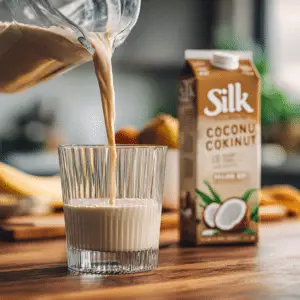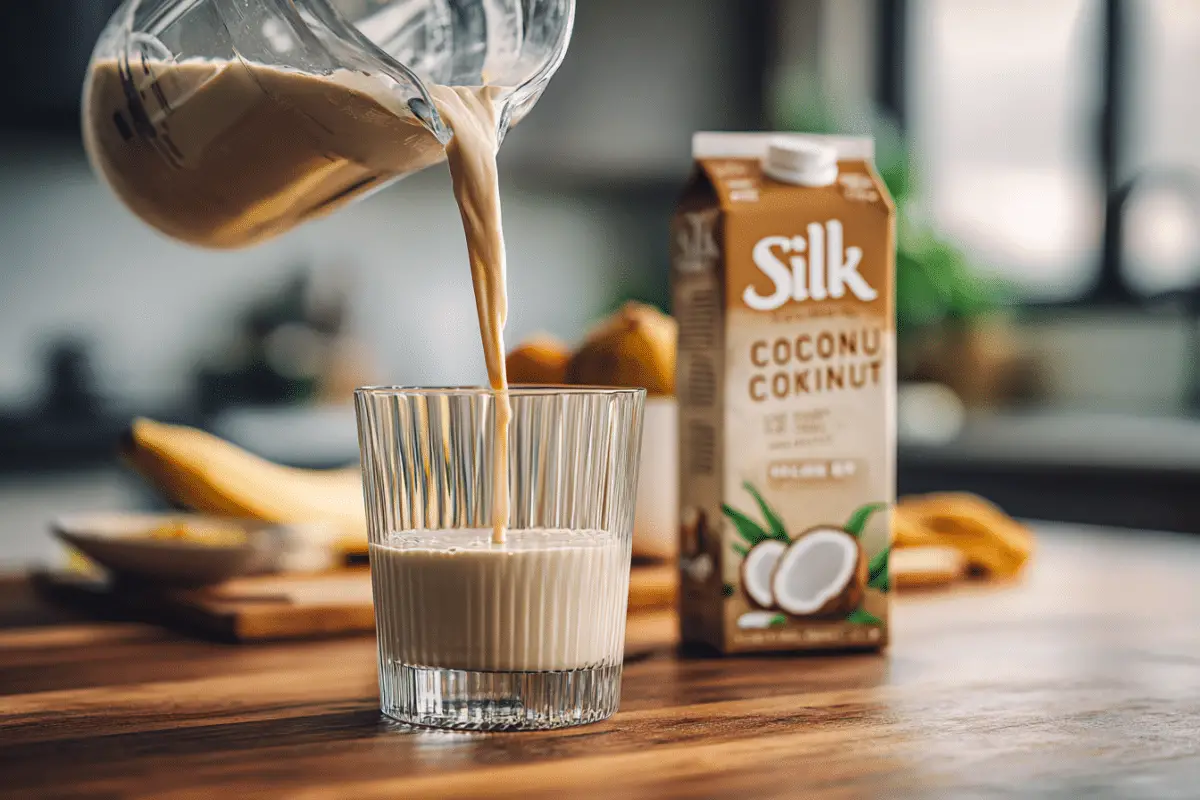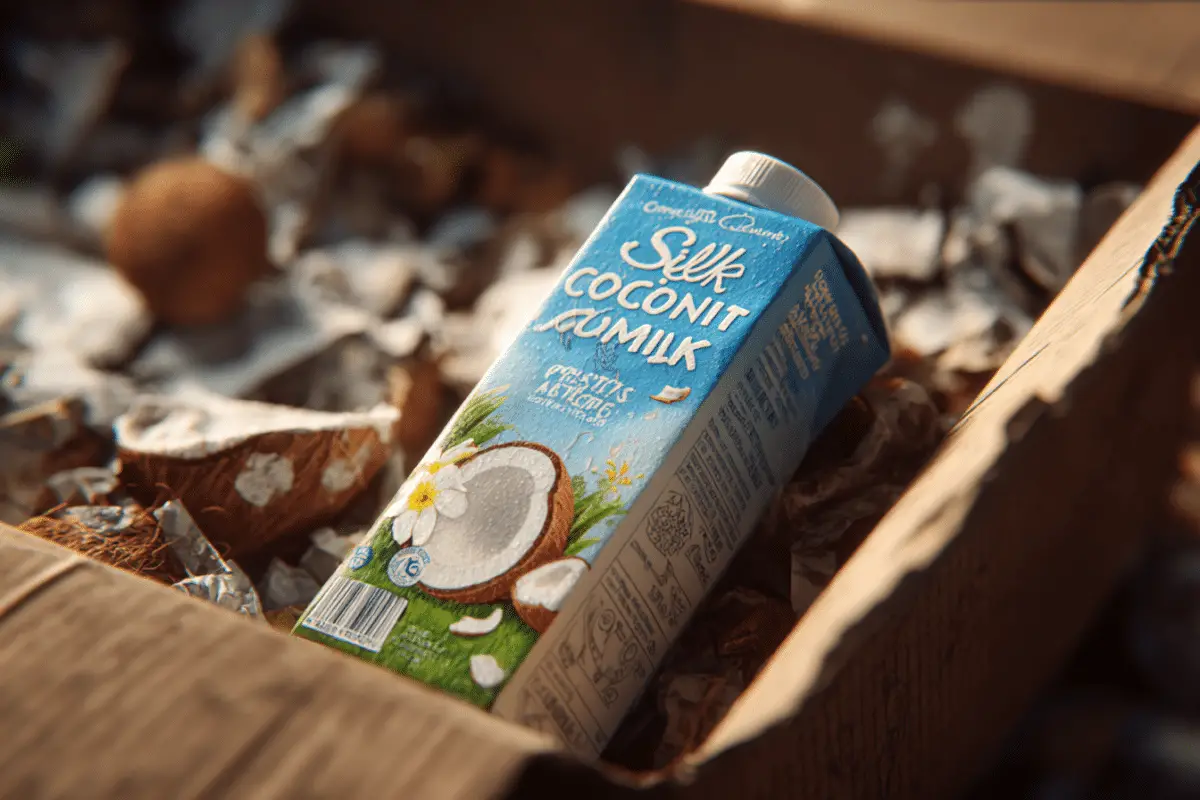In recent years, Silk Coconut Milk has become one of the most popular dairy alternatives on the market. Whether you’re vegan, lactose-intolerant, or simply seeking healthier beverage options, this smooth and creamy plant-based milk stands out. But what makes it different from traditional coconut milk or other non-dairy options like almond milk? And is it healthy enough to drink every day?

In this guide, we’ll break down everything you need to know about Silk Coconut Milk—its ingredients, nutritional value, and how it compares to other dairy-free choices. You’ll learn how it’s made, its potential health benefits, best ways to use it, and even which consumers should or shouldn’t opt for this product.
Check out our deep dive into Greek yogurt gut health to see how Silk Coconut Milk fits into a well-rounded non-dairy diet.
Let’s dive into what this popular plant-based beverage is really made of.

Tropical Smoothie with Silk Coconut Milk
Equipment
- 1 Blender High-speed blender preferred
- 1 Serving glass Chilled, optional
- 1 Measuring cup For accurate pouring
Ingredients
- Amount Unit Name Notes
- 1 cup Silk Coconut Milk Unsweetened preferred
- 0.5 cup Frozen mango Chopped
- 0.5 Banana Ripe
- 1 tbsp Chia seeds Optional but recommended
- 4 –5 Ice cubes Adjust based on preference
Instructions
- Add Silk Coconut Milk, frozen mango, banana, chia seeds, and ice cubes to a blender.
- Blend on high speed for 30–45 seconds until smooth and creamy.
- Pour into a chilled serving glass.
- Serve immediately. Garnish with coconut flakes or fresh fruit if desired.
Notes
Nutrition (per serving)
Note: Estimated based on the above ingredients- Calories: 180 kcal
- Fat: 5g
- Saturated Fat: 4g
- Carbohydrates: 30g
- Fiber: 5g
- Sugars: 18g
- Protein: 2g
- Calcium: 25% DV
- Vitamin B12: 50% DV
PART 1: What Is Silk Coconut Milk and How Is It Made?
What is Silk Coconut Milk?
Silk Coconut Milk is a plant-based milk alternative created by Silk, a company known for producing dairy-free products like soy, almond, and oat milk. Made from coconut cream blended with filtered water, it’s enriched with essential nutrients such as calcium, vitamin D, and B12—making it a fortified drink perfect for anyone looking to cut out dairy.
Unlike canned coconut milk, which is thicker and used primarily in cooking, Silk Coconut Milk is lighter and designed for daily consumption in smoothies, cereals, coffee, and baking. It has a pleasant coconut flavor without being overpowering, and it’s available in unsweetened and sweetened versions to fit various dietary preferences.
Because it contains no dairy, no lactose, no gluten, and no artificial flavors or colors, it’s often a top choice for those with food sensitivities.
How is Silk Coconut Milk Different from Regular Coconut Milk?
Traditional coconut milk—often used in Southeast Asian cooking—is made by grating the white flesh of mature coconuts and mixing it with water. This version is high in natural fats and is quite thick, often containing over 20% fat content. It’s not typically fortified and isn’t intended as a direct milk replacement for drinking.
On the other hand, Silk Coconut Milk is manufactured for drinkability and nutrition. Here’s a quick comparison:
| Feature | Silk Coconut Milk | Traditional Coconut Milk |
|---|---|---|
| Fat Content | ~4g per cup | ~20g per cup |
| Calcium & Vitamin D | Fortified | Not fortified |
| Usage | Smoothies, cereal, coffee | Curries, soups, sauces |
| Consistency | Thin & drinkable | Thick & creamy |
| Shelf Life (unopened) | Long (shelf-stable) | Short (refrigerated) |
The goal behind Silk’s version is to offer a more nutritious and convenient coconut milk, suitable for everyday use.
By producing this low-calorie, fortified version, Silk Coconut Milk makes it easier for people to enjoy the tropical taste of coconut without the excess fat or limited use of traditional coconut milk.
PART 2: Nutritional Profile of Silk Coconut Milk
Calories, Vitamins, and Nutrients Breakdown
If you’re watching your calorie intake or following a special diet, Silk Coconut Milk may be a smart addition to your meal plan. It’s a low-calorie, plant-based milk alternative that doesn’t sacrifice flavor or creaminess.
Here’s a breakdown of the nutrition per 1-cup (240ml) serving of unsweetened Silk Coconut Milk:
| Nutrient | Amount per Serving |
|---|---|
| Calories | 45 |
| Total Fat | 4.5g |
| Saturated Fat | 4g |
| Cholesterol | 0mg |
| Sodium | 30mg |
| Total Carbohydrate | 1g |
| Dietary Fiber | 0g |
| Sugars | 0g |
| Protein | 0g |
| Calcium | 25% DV |
| Vitamin D | 20% DV |
| Vitamin B12 | 50% DV |
| Vitamin A | 10% DV |
Despite having almost no protein, Silk Coconut Milk is rich in medium-chain triglycerides (MCTs), a type of fat that the body quickly converts into energy. It’s also fortified with calcium and vitamins D and B12—key nutrients that vegans or lactose-intolerant individuals often lack.
The unsweetened version is ideal for those following a keto, paleo, or low-carb diet, while the sweetened version offers a little indulgence for use in smoothies or desserts.
How It Compares to Dairy and Other Plant-Based Milks
Wondering how Silk Coconut Milk stacks up against cow’s milk or almond milk? Here’s a quick comparison to help you decide:
| Feature | Silk Coconut Milk | Cow’s Milk (2%) | Almond Milk |
|---|---|---|---|
| Calories | 45 | 120 | 60 |
| Fat | 4.5g | 5g | 2.5g |
| Saturated Fat | 4g | 3g | 0g |
| Protein | 0g | 8g | 1g |
| Calcium | Fortified | Naturally present | Fortified |
| Lactose | None | Contains | None |
While it lacks protein, Silk Coconut Milk wins in the categories of fat quality and digestibility. It’s a go-to for those avoiding allergens, added sugars, or artificial additives.
Discover great ideas like this Mediterranean-inspired smoothie that perfectly pairs with Silk Coconut Milk for a clean, energizing breakfast.
If you’re seeking a creamy texture without the drawbacks of dairy, this beverage strikes a smart balance between health and taste.
PART 3: Is Silk Coconut Milk Actually Coconut Milk?
Silk’s Processing and Ingredients Overview
This is a common question, and the answer might surprise you. Silk Coconut Milk is technically coconut milk—but it’s not the same as traditional, full-fat coconut milk used in curries or desserts.
Silk uses a blend of coconut cream and filtered water to produce a lighter, more drinkable form of coconut milk. This base is then fortified with vitamins and minerals and may contain natural thickeners like gellan gum or guar gum to maintain a consistent texture.
Here’s what you’ll typically find in a carton of Silk’s unsweetened coconut milk:
- Coconut cream
- Water
- Calcium carbonate
- Vitamin D2
- Vitamin B12
- Sea salt
- Gellan gum and locust bean gum (natural stabilizers)
In short, it’s a coconut-derived product—but optimized for modern diets and shelf stability.
Difference Between Traditional Coconut Milk and Silk Coconut Milk
Let’s clear up the confusion with a quick comparison:
| Feature | Traditional Coconut Milk | Silk Coconut Milk |
|---|---|---|
| Source | Grated coconut flesh | Coconut cream + water |
| Intended Use | Cooking | Drinking, mixing, baking |
| Fortified with Vitamins | No | Yes |
| Shelf-Stable | Sometimes (canned) | Yes (Tetra Pak) |
| Thickness | Thick, creamy | Light and smooth |
| Added Sweeteners or Flavors | Rarely | Available in flavored types |
So, is Silk Coconut Milk actually coconut milk? Yes—but it’s processed differently to be more versatile, healthier, and suitable as a daily beverage.
Don’t miss our guide on the health benefits of mushroom coffee—a great partner for plant-based milks like Silk.
PART 4: Health Benefits of Drinking Silk Coconut Milk
Skin, Heart, and Gut Health Benefits
One of the reasons Silk Coconut Milk is so popular is because it’s not just dairy-free—it’s nutrient-enriched and may support several aspects of your health.
Here are the top health benefits:
- Heart Health: Contains healthy fats like medium-chain triglycerides (MCTs) that may boost energy and support fat metabolism.
- Hydration: It’s water-based and low in sodium, helping with hydration without adding bloat.
- Bone Health: Fortified with calcium and vitamin D, essential for strong bones—especially in vegan diets.
- Immunity & Nerve Support: Vitamin B12 plays a crucial role in supporting the immune system and neurological function.
- Digestive Comfort: It’s free from lactose, making it gentle on sensitive stomachs.
For individuals with IBS, bloating, or lactose intolerance, this plant-based milk can be a game-changer.
Is It Good for Weight Management or Digestion?
Absolutely—but it depends on how you use it. Because Silk Coconut Milk is low in calories and carbs, it fits well into keto, paleo, Whole30, and intermittent fasting plans.
Its high content of MCTs helps with satiety and can encourage fat oxidation. And since it’s free of dairy, it often reduces digestive inflammation common with cow’s milk.
Looking for inspiration? Try this ginger beet juice benefits guide to pair with a coconut milk detox smoothie.
Still, it’s important to remember that while coconut fat can be beneficial in small amounts, overconsumption may add unnecessary saturated fat. Balance is key.
PART 5: Can You Drink Silk Coconut Milk Every Day?
What Happens If You Consume It Daily?
Many people wonder: Is it safe to drink Silk Coconut Milk every day? The answer is yes—for most people, daily consumption can be both enjoyable and beneficial, especially as a substitute for cow’s milk.
Here’s what happens when you include Silk Coconut Milk in your daily routine:
- You reduce your intake of lactose and dairy—ideal for people with lactose intolerance or dairy allergies.
- You gain hydration from a light, water-based beverage with only 45 calories per cup.
- You support your bone health with added calcium and vitamin D.
- You help meet your vitamin B12 needs, especially important for vegans.
Still, moderation is key. Drinking 1–2 cups a day as part of a balanced diet offers the benefits without overdoing the saturated fat content. Keep an eye on sweetened varieties, which may add extra sugars you don’t need.
Some people may experience:
- Slight digestive shifts if they’re new to coconut-based products.
- Possible allergic reactions (though rare), especially if sensitive to tree nuts.
Check out this expert article on the best cereal for diabetics—a perfect food to pair with unsweetened Silk Coconut Milk.
Potential Side Effects and Precautions
Silk Coconut Milk is generally safe, but here are a few precautions to consider:
- Low protein content: It contains 0g of protein, so don’t rely on it as your sole protein source.
- Saturated fat: Although MCTs are metabolized differently, excessive intake may not be ideal for everyone.
- Kid-friendly?: While fortified, kids need full-fat milk or balanced alternatives. Consult your pediatrician before switching.
In summary, Silk Coconut Milk is safe and healthy for daily use—especially when used in combination with other nutrient-rich foods.
PART 6: Is Silk Coconut Milk Better Than Almond Milk?
Nutrition Showdown: Silk Coconut Milk vs Almond Milk
Both Silk Coconut Milk and almond milk are top picks in the plant-based world. So how do they compare?
Let’s break down the key differences:
| Feature | Silk Coconut Milk | Silk Almond Milk |
|---|---|---|
| Calories (per cup) | 45 | 30 |
| Total Fat | 4.5g | 2.5g |
| Saturated Fat | 4g | 0g |
| Protein | 0g | 1g |
| Calcium | 25% DV | 35% DV |
| Taste | Creamy, tropical | Nutty, light |
| Best Use | Smoothies, baking, coffee | Cereal, light drinks |
Silk Coconut Milk wins on creaminess and flavor—it’s ideal in lattes, curries, and smoothies. Almond milk, being lower in fat and calories, is great for those strictly counting macros or looking for a more neutral taste.
Taste, Texture, and Recipes Comparison
- Coconut Milk Taste: Rich and mildly sweet with a tropical edge. Perfect for Thai dishes or creamy drinks.
- Almond Milk Taste: Subtle, nutty flavor. Works well with cereal or granola.
- Texture: Coconut milk is thicker and silkier, giving it a satisfying mouthfeel, especially when steamed or heated.
When it comes to versatility:
- Coconut milk shines in coffee, smoothies, sauces, and desserts.
- Almond milk excels in cold cereal, light baking, and protein shakes.
Ultimately, it depends on your preference, but if you’re seeking a more indulgent, creamy option, Silk Coconut Milk takes the win.
Don’t miss our guide to the purple cancer ribbon—a symbol of wellness and awareness that pairs with holistic food choices like plant-based milk.
PART 7: How to Use Silk Coconut Milk in Your Diet
Best Recipes: Smoothies, Coffee, and Cooking Ideas

Silk Coconut Milk is one of the most versatile plant-based drinks out there. Whether you’re blending up a morning smoothie or thickening a curry, its creamy texture and subtle coconut flavor make it a must-have kitchen staple.
Here are some top ways to use it:
- Smoothies
Blend Silk Coconut Milk with bananas, frozen berries, spinach, and a scoop of nut butter for a refreshing breakfast or post-workout snack. - Coffee & Lattes
Froths beautifully and adds a tropical twist to your morning cup. For best results, use a barista-style version of Silk Coconut Milk. - Baking
Swap it in for dairy milk in recipes like pancakes, muffins, or banana bread for a dairy-free upgrade. - Soups & Sauces
Use in creamy tomato soup, Thai curry, or a dairy-free béchamel sauce. - Cereal & Granola
Pour chilled Silk Coconut Milk over your favorite whole grain cereal or granola. It complements both sweet and nutty flavors.
Here’s a basic smoothie recipe using Silk Coconut Milk:
Tropical Energy Smoothie Recipe
- 1 cup Silk Coconut Milk
- ½ cup frozen mango
- ½ banana
- 1 tbsp chia seeds
- Ice cubes
Blend and enjoy!
Discover great ideas like this Mediterranean-inspired smoothie—a perfect match for coconut milk’s creamy flavor.
Storage Tips and Expiration Info
Proper storage ensures freshness and optimal nutrition:
- Unopened cartons: Store at room temperature. Shelf life is typically 6–12 months.
- After opening: Refrigerate and use within 7–10 days.
- Shake before use: Natural separation is common.
Avoid freezing, as it can alter the texture and consistency.
If it smells sour, changes in color, or has curdling—discard immediately.
PART 8: Who Should Choose Silk Coconut Milk?
Best for Lactose Intolerant and Vegan Diets
If you’re lactose intolerant, allergic to dairy, or following a plant-based lifestyle, Silk Coconut Milk may be the perfect fit. It’s:
- 100% plant-based
- Free from lactose, soy, and gluten
- Certified vegan and kosher
- Fortified with essential vitamins
It’s especially useful for:
- Vegans: Excellent source of calcium and B12, which are often lacking in plant-based diets.
- People with IBS or gut sensitivity: Easier on digestion than dairy or nut-based milks.
Don’t miss our purple cancer ribbon awareness article—a symbol of strength, just like your health journey with clean food choices.
Who Might Want to Avoid It?
While Silk Coconut Milk is suitable for most, it may not be the best option for:
- Those needing high protein: At 0g protein, it can’t replace dairy milk nutritionally in some cases.
- Individuals with coconut allergies: Though rare, coconut is a tree nut and can cause reactions in sensitive people.
- Children under 2: Pediatricians often recommend breast milk or fortified formula instead of non-dairy alternatives unless advised.
If you’re unsure whether it’s a good choice for your specific health needs, it’s always wise to check with a nutritionist or healthcare provider.
PART 9: Buying Guide and Sustainable Packaging
Where to Buy Silk Coconut Milk Online or In Stores

Silk Coconut Milk is widely available in both physical and online grocery outlets across the U.S. Whether you’re looking for the original, unsweetened, vanilla, or shelf-stable variety, here’s where to start:
| Store Type | Availability | Notes |
|---|---|---|
| Supermarkets | Whole Foods, Kroger, Safeway | Found in refrigerated or plant-based milk aisles |
| Big Box Stores | Target, Walmart | Often carry shelf-stable and bulk sizes |
| Online Retailers | Amazon, Thrive Market | Convenient for auto-delivery & bulk purchases |
| Direct Website | Silk.com | Offers coupons, recipes, and store locator |
Pro tip: Always check for “Unsweetened” or “Barista Blend” on the label to match your intended use (smoothies vs lattes).
Is Silk Brand Eco-Friendly? Packaging and Sustainability Efforts
The Silk brand is committed to sustainability, and its coconut milk products reflect that mission.
Key sustainability highlights:
- Carbon footprint labeling: Silk partners with Carbon Trust to track and reduce carbon emissions.
- Responsible coconut sourcing: Silk ensures that its coconut supply chain avoids exploitation and meets ethical labor standards.
- Recyclable packaging: Cartons are made with paperboard and recyclable where facilities exist.
- Water efficiency: Silk’s parent company, Danone North America, uses water-saving initiatives in manufacturing.
By choosing Silk Coconut Milk, you’re not just going dairy-free—you’re supporting a brand that prioritizes the planet.
FAQs About Silk Coconut Milk
Yes, it’s made from coconut cream and water. While it’s not as thick as canned coconut milk, it offers a drinkable, fortified alternative for daily use.
It supports hydration, is fortified with calcium and vitamins, contains healthy MCT fats, and is lactose-free—great for gut, heart, and bone health.
Yes! It’s safe for most people when consumed in moderation. Just be mindful of sweetened versions and protein content.
It depends on your preference. Coconut milk is creamier and richer; almond milk is lighter and lower in fat. Both are dairy-free and fortified.
